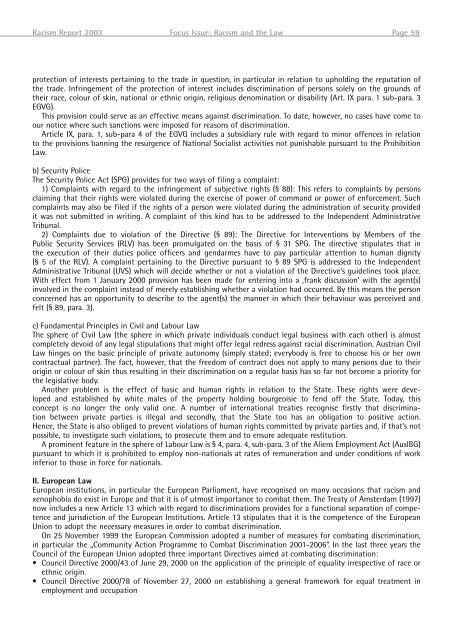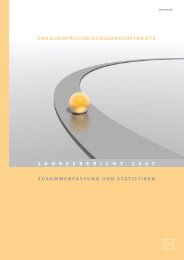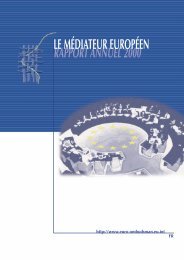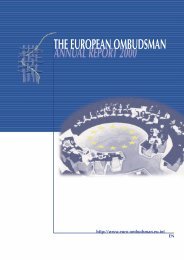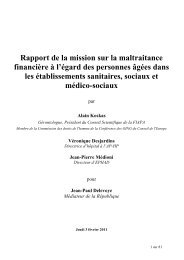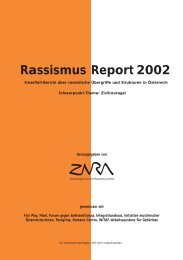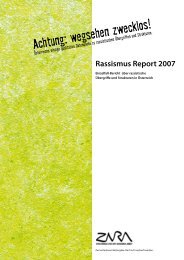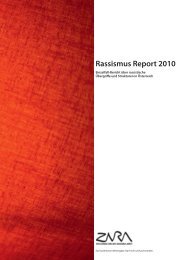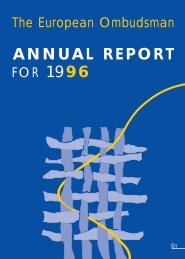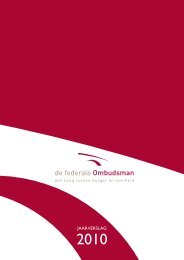Racism Report 2003 - Zara
Racism Report 2003 - Zara
Racism Report 2003 - Zara
Create successful ePaper yourself
Turn your PDF publications into a flip-book with our unique Google optimized e-Paper software.
<strong>Racism</strong> <strong>Report</strong> <strong>2003</strong> Focus Issue: <strong>Racism</strong> and the Law Page 59protection of interests pertaining to the trade in question, in particular in relation to upholding the reputation ofthe trade. Infringement of the protection of interest includes discrimination of persons solely on the grounds oftheir race, colour of skin, national or ethnic origin, religious denomination or disability (Art. IX para. 1 sub-para. 3EGVG).This provision could serve as an effective means against discrimination. To date, however, no cases have come toour notice where such sanctions were imposed for reasons of discrimination.Article IX, para. 1, sub-para 4 of the EGVG includes a subsidiary rule with regard to minor offences in relationto the provisions banning the resurgence of National Socialist activities not punishable pursuant to the ProhibitionLaw.b) Security PoliceThe Security Police Act (SPG) provides for two ways of filing a complaint:1) Complaints with regard to the infringement of subjective rights (§ 88): This refers to complaints by personsclaiming that their rights were violated during the exercise of power of command or power of enforcement. Suchcomplaints may also be filed if the rights of a person were violated during the administration of security providedit was not submitted in writing. A complaint of this kind has to be addressed to the Independent AdministrativeTribunal.2) Complaints due to violation of the Directive (§ 89): The Directive for Interventions by Members of thePublic Security Services (RLV) has been promulgated on the basis of § 31 SPG. The directive stipulates that inthe execution of their duties police officers and gendarmes have to pay particular attention to human dignity(§ 5 of the RLV). A complaint pertaining to the Directive pursuant to § 89 SPG is addressed to the IndependentAdministrative Tribunal (UVS) which will decide whether or not a violation of the Directive‘s guidelines took place.With effect from 1 January 2000 provision has been made for entering into a ‚frank discussion‘ with the agent(s)involved in the complaint instead of merely establishing whether a violation had occurred. By this means the personconcerned has an opportunity to describe to the agent(s) the manner in which their behaviour was perceived andfelt (§ 89, para. 3).c) Fundamental Principles in Civil and Labour LawThe sphere of Civil Law (the sphere in which private individuals conduct legal business with each other) is almostcompletely devoid of any legal stipulations that might offer legal redress against racial discrimination. Austrian CivilLaw hinges on the basic principle of private autonomy (simply stated; everybody is free to choose his or her owncontractual partner). The fact, however, that the freedom of contract does not apply to many persons due to theirorigin or colour of skin thus resulting in their discrimination on a regular basis has so far not become a priority forthe legislative body.Another problem is the effect of basic and human rights in relation to the State. These rights were developedand established by white males of the property holding bourgeoisie to fend off the State. Today, thisconcept is no longer the only valid one. A number of international treaties recognise firstly that discriminationbetween private parties is illegal and secondly, that the State too has an obligation to positive action.Hence, the State is also obliged to prevent violations of human rights committed by private parties and, if that‘s notpossible, to investigate such violations, to prosecute them and to ensure adequate restitution.A prominent feature in the sphere of Labour Law is § 4, para. 4, sub-para. 3 of the Aliens Employment Act (AuslBG)pursuant to which it is prohibited to employ non-nationals at rates of remuneration and under conditions of workinferior to those in force for nationals.II. European LawEuropean institutions, in particular the European Parliament, have recognised on many occasions that racism andxenophobia do exist in Europe and that it is of utmost importance to combat them. The Treaty of Amsterdam (1997)now includes a new Article 13 which with regard to discriminations provides for a functional separation of competenceand jurisdiction of the European Institutions. Article 13 stipulates that it is the competence of the EuropeanUnion to adopt the necessary measures in order to combat discrimination.On 25 November 1999 the European Commission adopted a number of measures for combating discrimination,in particular the „Community Action Programme to Combat Discrimination 2001-2006“. In the last three years theCouncil of the European Union adopted three important Directives aimed at combating discrimination:• Council Directive 2000/43 of June 29, 2000 on the application of the principle of equality irrespective of race orethnic origin.• Council Directive 2000/78 of November 27, 2000 on establishing a general framework for equal treatment inemployment and occupation


